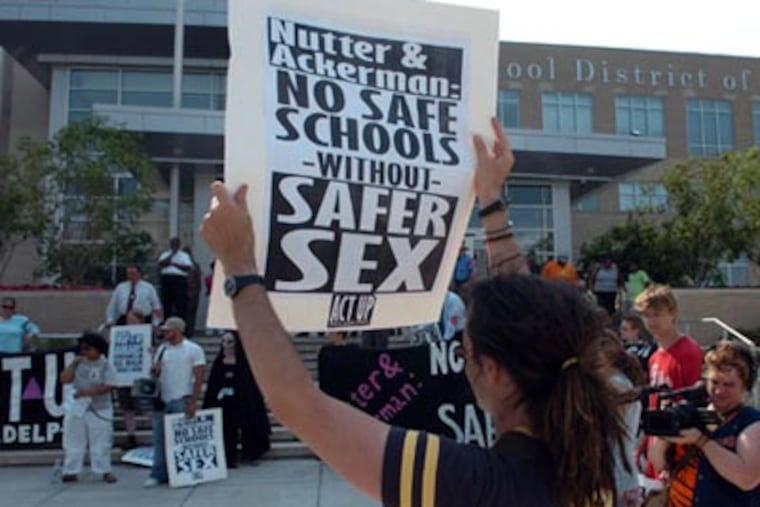Group: Schools should provide free condoms
Students who attend Germantown, Central and nine other city high schools get condoms at school free for the asking. But those teens who attend Washington, Kensington or 51 other schools have no such access.

Students who attend Germantown, Central and nine other city high schools get condoms at school free for the asking.
But those teens who attend Washington, Kensington or 51 other schools have no such access.
Clapping, banging drums and waving signs, the activist group that successfully pushed for condom distribution in some city schools 17 years ago yesterday demanded the prophylactics be given out in all public high schools as a way of preventing teen pregnancy and controlling the spread of sexually transmitted diseases.
"Youth need the truth! Condoms save lives!" they shouted in front of the Philadelphia School District building and City Hall.
Members of ACTUP Philadelphia, an AIDS awareness organization, are calling on Mayor Nutter and Arlene Ackerman, the new schools chief executive officer, to seek an increase in city, state and federal funds to expand the condom program to all city high schools.
Last school year, Philadelphia students took home 90,000 free condoms.
Currently, "health resource centers" in 11 high schools distribute condoms to students in 9th through 12th grades, and two more will open in the fall. That means that students in 49 high schools have no access to contraceptives, despite a district policy supporting "involvement in citywide efforts to maximize access to condoms."
A district spokeswoman said a lack of funding is the reason the program has not expanded.
Proponents say that a universal condom-access policy would reduce sexually transmitted diseases and teen pregnancy and could even help stem the city's high dropout rate.
"For some reason, this is an issue that gets put on the back shelf," said Samantha Sitrin, a member of ACTUP. "Even if people feel uncomfortable talking about this, people's lives are at risk."
Cristian Santos Leon, a student at Edison High, which does have a health-resource center, stood amid the crowd of 30 young people who rallied in the sweltering, late-afternoon heat.
During his first week of school, Leon, 18, walked into the bathroom to find two teens having sex, he said. STDs are prevalent at his school, he said, and he got involved in ACTUP because he wanted to make a stand.
"It's lives. Safe sex. This is important," Leon said.
Philadelphia teaches a "abstinence first" sexual education curriculum. In addition to condoms, some centers also administer pregnancy and STD tests.
"Why shouldn't a student at Dobbins have the same access as a student at Central?" asked Dorothy Mann, executive director of the Family Planning Council, the nonprofit that pays for the centers. "This is a program that has been working well for years."
It would cost an estimated $1.5 million to expand condom distribution to all high schools.
No district money goes into the centers, Mann said. The Family Planning Council receives city, state and federal money, which it turns over to providers such as Children's Hospital of Philadelphia and Planned Parenthood of Southeastern Pennsylvania to run the centers.
The school district does provide space for the centers and it also sends out letters to parents at the 11 schools informing them about the program and allowing them to opt their children out if they object.
The condom distribution policy is a worthy project, said Felecia Ward, a district spokeswoman, but since the school system does not fund it, expansion isn't up to them. "If [the Family Planning Council] comes up with additional money, and we have additional space, we will try to meet their needs," Ward said.
Doug Oliver, a spokesman for Mayor Nutter, said the mayor does not disagree with ACTUP, but it's not yet clear where the universal condom-distribution issue is on the mayor's agenda. "We're interested in expanding the program to all schools, but there is an outstanding question of resources before a decision can be made," Oliver said.
The district's policy dates back to 1991, when the HIV crisis prompted the school board to act.
It was controversial from the beginning. Early on, activists showered school board members with condoms at a meeting. The Archdiocese of Philadelphia condemned the program, and a lawsuit to block condom distribution was filed and dismissed.
Around the country, large urban districts are mixed on whether to offer condoms to high schoolers, but those that do typically offer them to all teens.